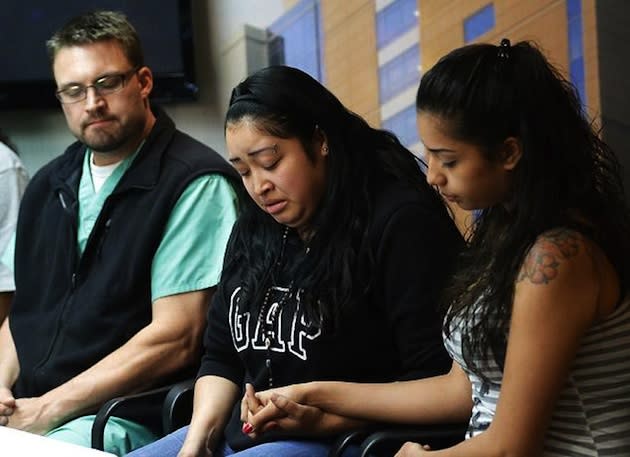Utah referee Ricardo Portillo dies days after being punched in head by rec league soccer player
Prep Rally previously brought you a deeply disturbing story from Utah, where a teen soccer player had punched a recreational soccer referee in the head, landing him in critical condition at an area hospital. Now that tale has taken an even more tragic turn after the referee in question died from complications related to injuries suffered in the attack.
As reported by the Associated Press and a variety of Utah news outlets, 46-year-old Ricardo Portillo died Saturday at Intermountain Medical Center in Murray, Utah, just outside Salt Lake City. The referee had been hospitalized there since the attack on April 27, where Portillo issued a yellow card to a player in a recreational match and was attacked by the player with a strong punch to his head.
The AP has reported that the player in question was a goalie, competing in a game at Taylorsville (Utah) Eisenhower Junior High. The yellow card was connected with a play on a corner kick, where Portillo saw the goalkeeper in question push an opponent and decided the action was worthy of a formal caution. As he wrote down the goalie’s name in his notebook, the player reportedly snuck up alongside the ref and punched him directly in the head.
"When he was writing down his notes, he just came out of nowhere and punched him," Johanna Portillo, the victim’s daughter, told the AP.
Portillo’s reaction to the punch was not immediate, but was frightening. The 46-year-old reportedly said he felt fine in the immediate aftermath of the attack, but then asked to be held up because he felt dizzy. Portillo then sat down on the field and began vomiting blood, eliciting panicked calls for an emergency ambulance at the field.
The goalie in question has since been booked into juvenile detention on suspicion of aggravated assault, though he could face additional charges now that Portillo has died. There has also been an ongoing debate about whether to charge the teen as an adult, despite the fact that he is 17 and not 18-years-old.
The now-deadly attack is just the latest disturbing example of aggressive action against referees going far beyond the realm of what is even remotely acceptable. More often it has been parents attacking referees, though players have occasionally gone beyond the realm of the reasonable in their reactions as well.
Most recently, a parent of an athlete in a Nebraska 7th grade church basketball league was attacked and had his glasses snapped in half. Similarly, a March youth hockey game in Hamilton, Ontario was the site of a parental attack on a referee who had the temerity (in their eyes) to break up a potential fight between players of the teams in the game was was officiating.
Perhaps the most disturbing attack before the Taylorsville tragedy came in Florida in 2011, where a group of players and coaches violently attacked a referee at a Sarasota youth football game.
Youth and prep soccer hasn't been free of violence in the past, either. While former New Mexico women's soccer player Elizabeth Lambert remains the benchmark for aggressive and violent play, Lewisville (S.C.) High athlete Annette McCullough received an assault charge for aggressive attacking a foe in a 2012 game and, in Utah, Salt Lake City (Utah) East High senior Petiola Manu was notably caught violently kneeing a foe during a game as well.
One can only hope that the lessons from this attack -- and the subsequent jail time that the teen in question is likely to serve -- will provide ample deterrent for future athletes and parents who struggle to contain their emotions in the midst of what is just a game, even if similar incidents in the past haven't succeeded in doing so.
Want more on the best stories in high school sports? Visit RivalsHigh or connect with Prep Rally on Facebook and follow us on Twitter.



